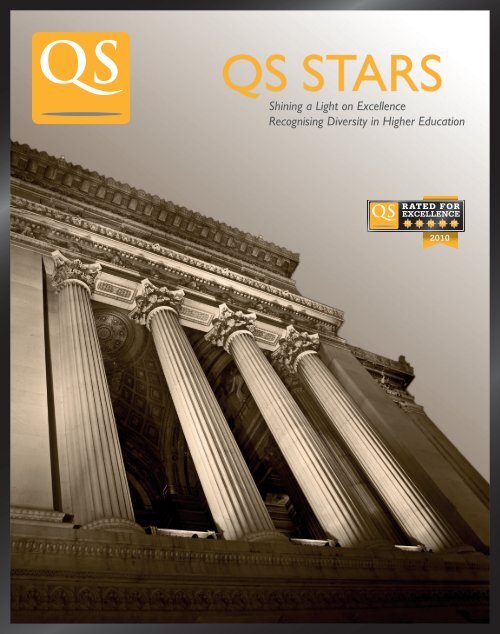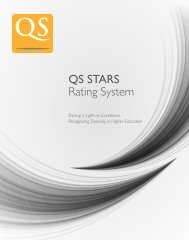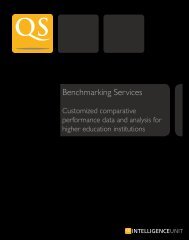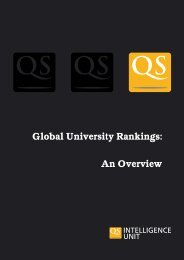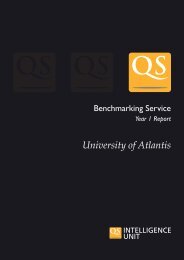QS STARS - QS Intelligence Unit
QS STARS - QS Intelligence Unit
QS STARS - QS Intelligence Unit
You also want an ePaper? Increase the reach of your titles
YUMPU automatically turns print PDFs into web optimized ePapers that Google loves.
<strong>QS</strong> <strong>STARS</strong><br />
Shining a Light on Excellence<br />
Recognising Diversity in Higher Education<br />
2010
<strong>QS</strong> Stars<br />
The <strong>QS</strong> Stars system evaluates universities against a range of important performance indicators<br />
based on a ratings method. It awards Stars to an institution, based on a range of criteria and<br />
can include universities not traditionally well-placed in rankings. It is an opportunity for these<br />
universities to highlight their strengths via awarded recognition.<br />
<strong>QS</strong> Stars also offers an international standard for comparison for any participating institution. This<br />
is particularly useful for universities focused on boosting their international marketing efforts. The<br />
award is licensed to an institution to highlight its Star rating in all visual communications.<br />
Traditional rankings may not recognize the excellence offered<br />
by universities in many areas. These institutions have the<br />
opportunity to shine within the <strong>QS</strong> Stars rating system.<br />
About <strong>QS</strong> <strong>Intelligence</strong> <strong>Unit</strong><br />
The <strong>QS</strong> <strong>Intelligence</strong> <strong>Unit</strong> (<strong>QS</strong>IU) strives to be the most trusted independent source of global<br />
intelligence in the Higher Education sector.<br />
Since 1990, <strong>QS</strong> has conducted research in a range of education and employment areas beginning<br />
with a global survey of MBA employers. The annual <strong>QS</strong> World University Rankings ® has been<br />
produced since 2004, encompassing the most well-known range of research projects that <strong>QS</strong><br />
operates.<br />
With operations in London and Singapore, <strong>QS</strong>IU delivers detailed analysis and is committed to<br />
the key values of rigorous integrity, undeniable value and charismatic presentation.<br />
Now, in response to increasing public interest in comparative data on universities and<br />
organizations, and the growing demand from institutions to develop deeper insight into their<br />
competitive environment, <strong>QS</strong>IU has added <strong>QS</strong> Stars to its portfolio of distinct services.<br />
Trusted. Independent. Global.
What are the benefits?<br />
A <strong>QS</strong> Stars rating gives a university the opportunity to highlight its strengths, whether or not<br />
it appears in rankings. The <strong>QS</strong> Star ratings include a broader range of criteria than traditional<br />
rankings.<br />
International Recognition<br />
<strong>QS</strong> Stars provides an opportunity for universities to gain international recognition outside of<br />
rankings. It also benefits institutions where English is not the first language.<br />
Web<br />
<strong>QS</strong> Stars also offers benefits to institutions that already<br />
feature in the <strong>QS</strong> World University Rankings ® . The<br />
<strong>QS</strong> Stars ratings will appear on the main Rankings pages<br />
on Topuniversities.com, alongside the university ranking<br />
(as shown here), as it indicates an additional level of<br />
detail beyond that measured in the rankings themselves.<br />
It also provides important and easily understood<br />
additional information, which can be considered at the<br />
earliest stages of any decision-making process.<br />
Topuniversities.com: is a highly effective and popular<br />
online communication platform receiving in excess of<br />
approximately 10 million visits in 2010. The rating can<br />
also appear on an intermediate profile page.<br />
Scorecard: <strong>QS</strong> Stars can be used as a search criterion<br />
in the online search tool for students.<br />
* Image and <strong>QS</strong> Stars Rating are for illustrative purposes only.<br />
<strong>QS</strong> Events: Star ratings will also be seen by the<br />
400,000 people who register for one of the 215 <strong>QS</strong><br />
events per year, representing 10% of the global student<br />
population.<br />
Print<br />
<strong>QS</strong> Stars takes the form of an award which is licensed<br />
for reprinting purposes to participating universities.<br />
The award badge takes two forms: it may stand alone<br />
to highlight overall institutional excellence, or may be<br />
used to highlight specialist strengths (exampled on<br />
page 9)<br />
2010
Criteria<br />
The objective of the <strong>QS</strong> Stars rating is to assess universities according to a broader range of criteria,<br />
giving them a greater opportunity to stand out in their particular areas of excellence.<br />
A star rating indicates an additional level of detail beyond that measured in ranking results. It can<br />
encourage users and readers to accept that ranking results ought to be analyzed and understood<br />
rather than simply taken at face value. It can also provide additional important information that may<br />
be used during the earliest stages of the decision-making process for university applications.<br />
Ratings are not dependent on the performance of other institutions, but evaluate an individual<br />
institution’s performance and measure it against pre-set thresholds.<br />
Distribution of Points<br />
<strong>QS</strong> <strong>STARS</strong><br />
Research Quality - 150<br />
Graduate Employability - 150<br />
Core Criteria<br />
Teaching Quality - 150<br />
Infrastructure - 100<br />
Advanced Criteria<br />
1000 Internationalization - 150<br />
Knowledge Transfer - 50<br />
Specialist Criteria<br />
Third Mission - 50<br />
Rank in Specialist Subject - 200
Core Criteria Criteria<br />
These criteria feature the the key key building building blocks blocks of a university of a university whether whether focused globally, focused domestically globally, domestically or locally or locally<br />
Indicator<br />
Maximum Points<br />
1. Research Quality 150<br />
1.1. Academic Peer Endorsements<br />
Maximum points for 150 academic referees or over. Scaled proportion of the points thereafter based on academic<br />
survey data from the <strong>QS</strong> World University Rankings®<br />
40<br />
1.2. Citations per Paper<br />
Maximum points for 6 citations per paper (adjusted for specialist institutions)<br />
1.3. Research Papers per Faculty<br />
Maximum points for 7 papers per faculty member (adjusted for specialist institutions)<br />
1.4. Prolific Academic Experts<br />
Maximum points for 20 faculty members internationally recognized for work (e.g. Nobel Prizes or equivalent awards)<br />
40<br />
40<br />
30<br />
2. Graduate Employability 150<br />
2.1. Recruiter Review<br />
Maximum points for 40 employer referees or over. Scaled proportion of the points thereafter based on employer survey<br />
data from the <strong>QS</strong> World University Rankings®<br />
50<br />
2.2. Graduate Employability<br />
Maximum points for 80% of graduated students employed within 12 months of graduation (excluding those not actively<br />
seeking work e.g. pursuing further study)<br />
2.3. Careers Service Support<br />
Maximum points for 10 full-time careers advisors OR one full-time career adviser per 1000 students<br />
50<br />
50<br />
3. Teaching Quality 150<br />
3.1. Overall Student Satisfaction<br />
Maximum points for 75% student satisfaction or higher with scaled scores down to 50% student satisfaction. Results 40<br />
based on a minimum 20% response rate using the National Student Satisfaction Survey or equivalent.<br />
3.2. Satisfaction with Teaching<br />
Maximum points for 75% student satisfaction or higher with scaled scores down to 50% student satisfaction. Results<br />
based on a minimum 20% response rate using the National Student Satisfaction Survey or equivalent.<br />
3.3. Further Study<br />
Maximum points for 30% of graduated students pursuing further study within 12 months of graduation<br />
3.4. Student/ faculty ratio<br />
Maximum points for a 10:1 (10%) student/faculty ratio<br />
40<br />
20<br />
50<br />
4. Infrastructure – <strong>QS</strong> Audit 100<br />
4.1. Sporting facilities<br />
A maximum of 2 points for each of the following on-campus facilities with 4 bonus points for 6 or more:<br />
(i) swimming pool; (ii) fitness gym; (ii) indoor sports courts; (iii) outdoor sports courts; (iv) outdoor sports pitches; (v)<br />
20<br />
athletics track; (vi) stadium; (vii) full-time sports coaches and/or medical staff<br />
4.2. Medical facilities<br />
Maximum points for one on-campus medical centre with minimum 1 full time qualified medical doctor OR One full<br />
time nurse per every 3000 full time students<br />
4.3. Student societies<br />
Maximum points for 20 student administered organizations<br />
4.4. Student accommodation<br />
Maximum points for the same number of rooms as first year students<br />
4.5. IT infrastructure<br />
Maximum points for one on computer per 5 students OR internet access in every university provided student room OR<br />
WIFI access across 80% of campus area (excluding parks and sports fields)<br />
4.6. Library facilities<br />
Maximum points for Investment of $100 per student over the past year OR one new library catalogue entries per<br />
student<br />
10<br />
10<br />
20<br />
20<br />
20<br />
Version 4 - 28 September 2010 3
Advanced Criteria<br />
For Advanced a university Criteria to aspire to being truly world-class, its mission and its impact must extend further than the basics.<br />
These For a advanced university to criteria aspire to identify being truly important world-class, factors its mission that universities and its impact with must a solid extend foundation further than in the the basics. core This criteria selection might<br />
target of criteria to advance looks at to important a higher factors level that of performance a university with and a solid recognition. foundation in the core criteria might target to advance to a<br />
higher level of performance and recognition.<br />
Indicator<br />
Maximum Points<br />
5. Internationalization 150<br />
5.1. International Faculty<br />
Maximum points for 25% international faculty<br />
20<br />
5.2. Institution Research Collaborations<br />
Maximum points for 25 university research collaborations with <strong>QS</strong> top 500 universities in previous three years published<br />
rankings<br />
5.3. International Students<br />
Maximum points for 20% international students<br />
5.4. International Student Support - religious facilities<br />
Maximum points for at least one place of worship for a minimum of three major religious groups (Christianity, Islam,<br />
Sikhism/Hinduism, Buddhism, Taoism and Judaism) OR a Multi-denominational religious facility<br />
5.5. Inbound Exchange Students<br />
Maximum points for 2% inbound students against total number of students<br />
5.6. Outbound Exchange Students<br />
Maximum points for 2% outbound students against total number of students<br />
50<br />
20<br />
10<br />
20<br />
20<br />
5.7. International Diversity<br />
Maximum points for 20 nationalities represented in student body<br />
10<br />
6. Innovation & Knowledge Transfer 50<br />
6.1. Patents<br />
Maximum points for 50 current patents registered with national or international patent offices<br />
20<br />
6.2. Spin-off Companies<br />
Maximum points for 5 spin-off companies established in the last five years still operating and no longer requiring<br />
support from the university<br />
6.3. Industrial research<br />
Maximum points for Joint research projects with 10 distinct corporations (non-university), yielding publications in<br />
Scopus in the last 5 years<br />
10<br />
20<br />
7. Third Mission 50<br />
7.1. Community Investment & Development<br />
Maximum points for 1% of turnover or USD$2 million (whichever is smaller) contribution to community projects within<br />
200km of any campus of affiliated facility<br />
25<br />
7.2. Scholarships and bursaries<br />
Maximum points for 1% of turnover spent on funds for scholarships OR attendance made possible for 100 students on<br />
50% scholarships<br />
25<br />
Version 4 - 28 September 2010 4
Specialist Criteria Criteria<br />
Excellence Excellence in a narrow in a narrow field field is as is as valid valid a a claim to to world-class status as competence in in the the round. These These criteria criteria are are<br />
designed designed to extend to extend credit credit where where it’s it's due. due.<br />
Indicator<br />
Maximum Points<br />
8. Rank in Specialist Subject* 200<br />
Broad Faculty Area Ranking<br />
Highly ranked in any one of 5 broad specialist areas based on <strong>QS</strong> ranking systems in (i) IT & Engineering (ii) Natural<br />
Sciences (iii). Life Sciences (iv) Arts & Humanities (v) Social Sciences. Maximum points for Ranked positions 1-50; scaled<br />
scores down to position 300<br />
OR<br />
Narrow Subject Area Rankings<br />
2 highest scoring disciplines based on one of the following Subject Area Rankings is the <strong>QS</strong> ranking systems or reliable<br />
3 rd party evaluations Maximum points for Ranked positions1-20; scaled scores down to a minimum of 25points at<br />
position 100<br />
OR<br />
Internationally Recognized Accreditations<br />
25 points per accreditation up to a maximum of 50 points<br />
Thresholds THRESHOLDS & Pre-Requisites & PRE-REQUISITES<br />
1 star – 100 / 1000<br />
1 Star (100 Must / 1000) have the authority to grant valid degree level programs in its own name<br />
• Must have the authority to grant valid degree level programs in it is own name<br />
2 stars – 250 / 1000ntern<br />
2 Stars (250 / 1000)<br />
3 stars – 400 / 1000<br />
3 Stars (400 1000)<br />
A minimum of 5 active student exchange agreements with top 500 universities (in any of the previous three years world<br />
• A minimum of five student exchange agreements with top 500 universities (in the <strong>QS</strong> World University<br />
rankings)<br />
Rankings ® of any of the preceding three years)<br />
4 Stars 4 stars (550 – / 1000)<br />
• Must Must have have at at least 75 academic referees or must or must have at have least at 2 citations least two per faculty citations member per (for faculty any institution member not (for any<br />
institution focused not exclusively focused in exclusively two or fewer in of two our or broad fewer faculty of our areas) broad faculty areas)<br />
• Must Must have have at least at least two 2 citations per per faculty faculty member member (for any (for institution any institution not focused not exclusively focused exclusively in Arts & Social in Arts Sciences) & Social<br />
Sciences) Must have at least 20 employer referees<br />
• Must<br />
Must<br />
have<br />
have<br />
at least<br />
at least<br />
20<br />
1%<br />
employer<br />
international<br />
referees<br />
students<br />
A minimum of 10 active student exchange agreements with top 500 universities (in any of the previous three years<br />
• Must have at least 1% international students<br />
world rankings)<br />
• A minimum of 10 active student exchange agreements with top 500 universities (in the <strong>QS</strong> World University<br />
5 stars Rankings – 700 ® / 1000 of any of the preceding three years)<br />
5 Stars (700 Must / have 1000) at least 150 academic referees or 3 citations per faculty member (for any institution not focused exclusively<br />
• Must in have two or at fewer least of 150 our academic broad faculty referees areas) or 3 citations per faculty member (for any institution not focused<br />
exclusively Must have in two at least or 5% fewer international of our broad faculty faculty areas)<br />
• Must Must have have at least at least 5% 5% international faculty students<br />
• Must<br />
Must<br />
have<br />
have<br />
at least<br />
at least<br />
5%<br />
40<br />
international<br />
employer referees<br />
students<br />
Must have at least 150 academic referees<br />
• Must have at least 40 employer referees<br />
Must have a minimum of 80 points in Infrastructure category<br />
• Must have at least 150 academic referees<br />
• Must have a minimum of 80 points in the Infrastructure category within Core Criteria<br />
Version 4 - 28 September 2010 5<br />
Methodology Version 3.1
Category Rankings<br />
<strong>QS</strong> Stars offers universities further opportunity to highlight their strengths across the categories<br />
within the evaluation system, allowing the reader to view the individual strengths.<br />
Category Rankings<br />
Threshold<br />
Threshold<br />
Research Quality<br />
Graduate Employability<br />
1 star<br />
15/150<br />
1 star<br />
15/150<br />
2 stars<br />
3 stars<br />
35/150<br />
60/150<br />
2 stars<br />
3 stars<br />
35/150<br />
60/150<br />
4 stars<br />
5 stars<br />
85/150<br />
105/150<br />
4 stars<br />
5 stars<br />
85/150<br />
105/150<br />
Teaching Quality<br />
Infrastructure<br />
1 star<br />
15/150<br />
1 star<br />
10/100<br />
2 stars<br />
3 stars<br />
35/150<br />
60/150<br />
2 stars<br />
3 stars<br />
25/100<br />
40/100<br />
4 stars<br />
85/150<br />
4 stars<br />
55/100<br />
5 stars<br />
105/150<br />
5 stars<br />
70/100<br />
Internationalization<br />
1 star<br />
15/150<br />
Innovation & Knowledge Transfer<br />
1 star<br />
5/50<br />
2 stars<br />
3 stars<br />
35/150<br />
60/150<br />
2 stars<br />
3 stars<br />
15/50<br />
20/50<br />
4 stars<br />
85/150<br />
4 stars<br />
30/50<br />
5 stars<br />
105/150<br />
5 stars<br />
35/50<br />
Third Mission<br />
1 star<br />
5/50<br />
Specialist Criteria<br />
1 star<br />
20/200<br />
2 stars<br />
15/50<br />
2 stars<br />
50/200<br />
3 stars<br />
4 stars<br />
20/50<br />
30/50<br />
3 stars<br />
4 stars<br />
80/200<br />
110/200<br />
5 stars<br />
35/50<br />
5 stars<br />
140/200<br />
* Image and <strong>QS</strong> Stars Rating are for illustrative purposes only.
Shining a light on excellence<br />
<strong>QS</strong> Stars allows your institution’s specialist subject area to be highlighted. Appearing in any of the<br />
following rankings will earn you points in the specialist critera, allowing to spotlight your specialist<br />
strengths.<br />
Broad Faculty Area Rankings<br />
Appearing within the top 300 broad faculty area<br />
rankings can earn your institution specialist criteria<br />
points.<br />
* For illustrative purposes only.<br />
SOCIAL SCIENCES<br />
2010<br />
Narrow Subject Area Rankings<br />
<strong>QS</strong> Stars also offers institutions the opportunity to<br />
highlight their narrow subject areas. Institutions are<br />
able to highlight several of their highly ranked subject<br />
areas.<br />
ARCHITECTURE<br />
MATHEMATICS<br />
2010<br />
Accreditation<br />
Institutions that do not have a ranked subject but<br />
have had a subject accredited by an internationally<br />
recognised accreditation body, also have the<br />
opportunity to highlight their specialist subject area.
Development Road Map - The institutional report<br />
Universities that participate in the <strong>QS</strong> Stars evaluation program receive a comprehensive report,<br />
similar to the one below, which details their results as measured by a comprehensive <strong>QS</strong> proprietary<br />
analysis. A complete sample report can be viewed at www.topuniversities.com<br />
2010 2010<br />
The University Overall Earned Points<br />
Criteria Points<br />
Available<br />
Core Criteria<br />
Additonal Criteria<br />
Specialist Criteria<br />
Sample University<br />
Earned Points<br />
0 100 200 300 400 500 600 700 800 900 1000<br />
Sample University Earned Points<br />
Criteria Points Available<br />
Core Criteria 377 550<br />
Additonal Criteria 190 250<br />
Specialist Criteria 60 200<br />
Figure 4<br />
Figure 17 is a stacked bar chart that displays Sample University results in each criteria overall. No<br />
points were achieved in Specialist Criteria; an overall 627.29 points were earned from the 1000<br />
points available. As a result, Sample University is awarded 4 stars.<br />
<strong>QS</strong> Stars Development Road Map<br />
Sample University<br />
<strong>QS</strong> Stars – Copyright © 2010 <strong>QS</strong> <strong>Intelligence</strong> <strong>Unit</strong> (a division of <strong>QS</strong> Quacquarelli Symonds Ltd) Page | 10<br />
<strong>QS</strong> Stars –© 2010 <strong>QS</strong> <strong>Intelligence</strong> <strong>Unit</strong> (a division of <strong>QS</strong> Quacquarelli Symonds Ltd)<br />
<strong>QS</strong> Star Ratings explained<br />
One Star – A typical One Star university has established all the key components required to<br />
provide a quality service to its students and, in many cases, the foundations upon which to build a<br />
strong domestic reputation. A One Star institution will often have been established within the last<br />
twenty years and will be putting in place the leadership with ambition to develop quickly.<br />
Two Stars – A typical Two Star university is active in research and has an established domestic<br />
reputation. The institution is a key part of its local community and will often have begun to consider<br />
international opportunities.<br />
Three Stars – A typical Three Star university is nationally well recognised, and may have also begun<br />
to attract international recognition. This institution maintains a reputable level of research and its<br />
graduates are attractive to employers.<br />
Four Stars – A typical Four Star university is highly international, demonstrating excellence in both<br />
research and teaching. The institution provides an excellent environment for students and faculty.<br />
Five Stars – A typical Five Star institution is generally world-class in a broad range of areas, enjoys<br />
a high reputation and has cutting-edge facilities and internationally renowned research and teaching<br />
faculty.
““NTU is undergoing rapid development and the current<br />
ranking from <strong>QS</strong> is a confirmation that NTU today has a high<br />
international standing. NTU is participating in a <strong>QS</strong> Star audit<br />
to establish our strengths as a university across a broader set of<br />
criteria than can be measured in any ranking system, to provide<br />
valuable information for our many stakeholders: students,<br />
employers, fellow academics as well as our local community.”<br />
Professor Bertil Andersson,<br />
Provost, Nanyang Technological University<br />
”
Pricing<br />
<strong>QS</strong> <strong>STARS</strong> AUDIT FEE - US$9,850<br />
• Audit valid for three years<br />
• Includes report detailing basis for achieved award and guidance on<br />
maintaining/improving award level<br />
• Optional annual audit can be conducted at an extra fee<br />
<strong>QS</strong> <strong>STARS</strong> ANNUAL LICENCE FEE - US$6,850 (Minimum term 3 years)<br />
• Includes upgrade to intermediate profile level on www.topuniversities.com<br />
• Presentation of specific results on a customised link<br />
• Licence to use supplied graphics and logos in online and printed materials<br />
to present rating to stakeholders<br />
Please note, the invoicing schedule will be as follows:<br />
Year 1 - US$16,700 (Audit fee and Annual licence fee)<br />
Year 2 - US$6,850 (Annual licence fee)<br />
Year 3 - US$6,850 (Annual licence fee)
Participation Form<br />
Name<br />
Position<br />
Institution Name<br />
Institution Address<br />
Email Tel Fax<br />
3 YEAR AUDIT OPTIONAL ANNUAL AUDIT<br />
TOTAL COST___________________________<br />
Confirmation of your booking and an invoice will be sent to you via email. A <strong>QS</strong> representative will be in contact. This<br />
contract is binding.<br />
Authorized Signatory<br />
Name of Signatory<br />
Signature/Stamp<br />
Position<br />
Date<br />
Please fax form to Deena Al-Hilli +44 (0)20 7428 2761<br />
FOR FURTHER INFORMATION ON <strong>QS</strong> <strong>STARS</strong><br />
PLEASE CONTACT<br />
Deena Al-Hilli<br />
Project Manager<br />
deena@qs.com<br />
+44(0)20 7428 2793
<strong>QS</strong> - OUR MISSION<br />
To enable motivated people around the<br />
world to fulfill their potential, by fostering<br />
educational achievement, international<br />
mobility and career development.<br />
www.qs.com<br />
Tel.: +44 (0)207 428 2782<br />
<strong>QS</strong> with offices in: London, Paris, Singapore, Stuttgart, Boston, Johannesburg, Shanghai, Sydney, Washington DC<br />
http://iu.qs.com<br />
intelligenceunit@qs.com


